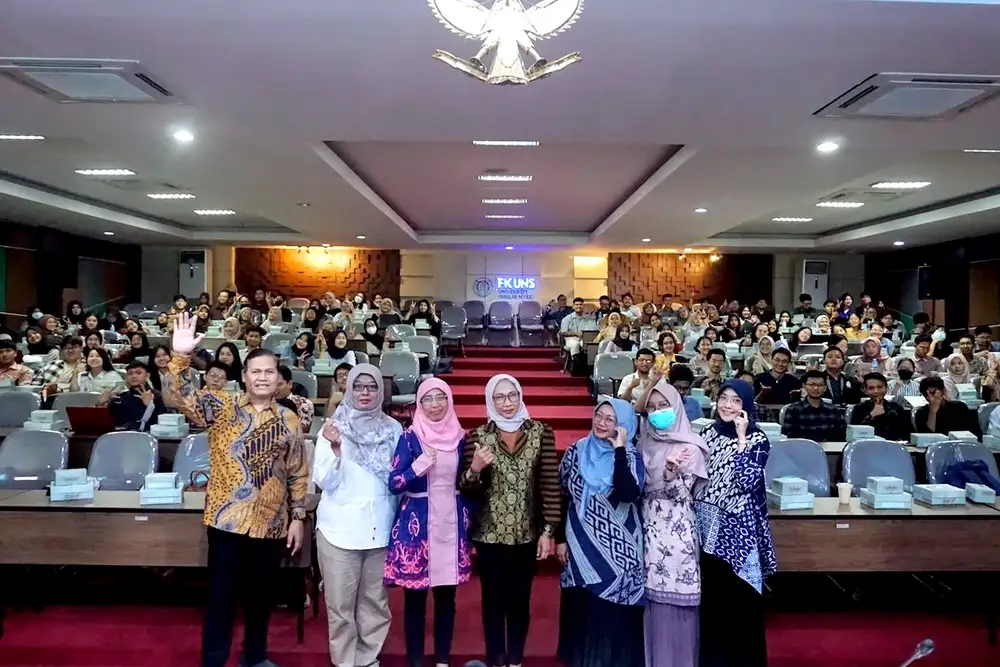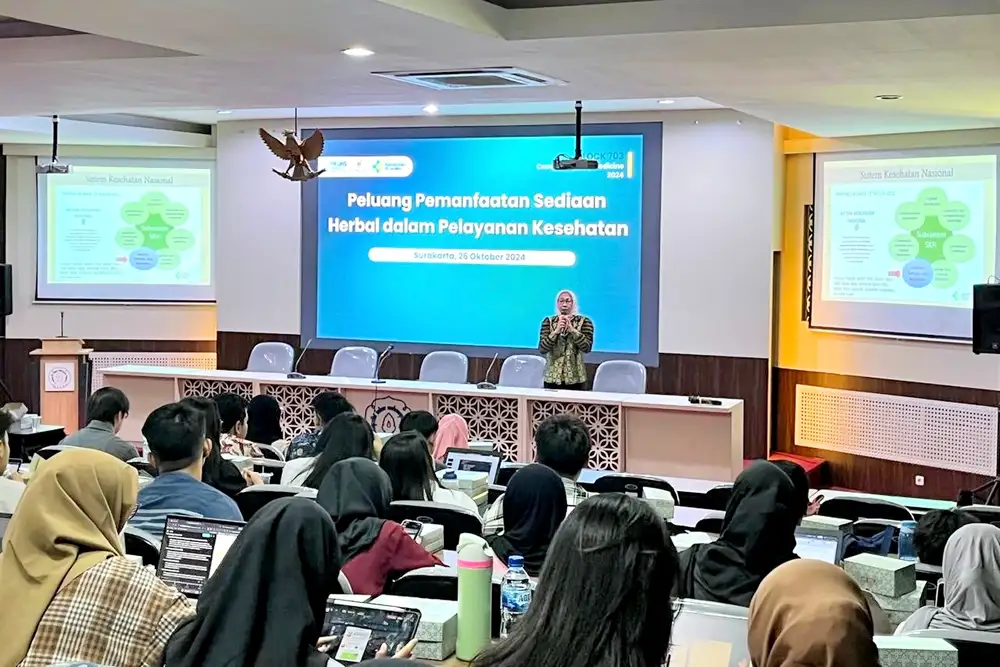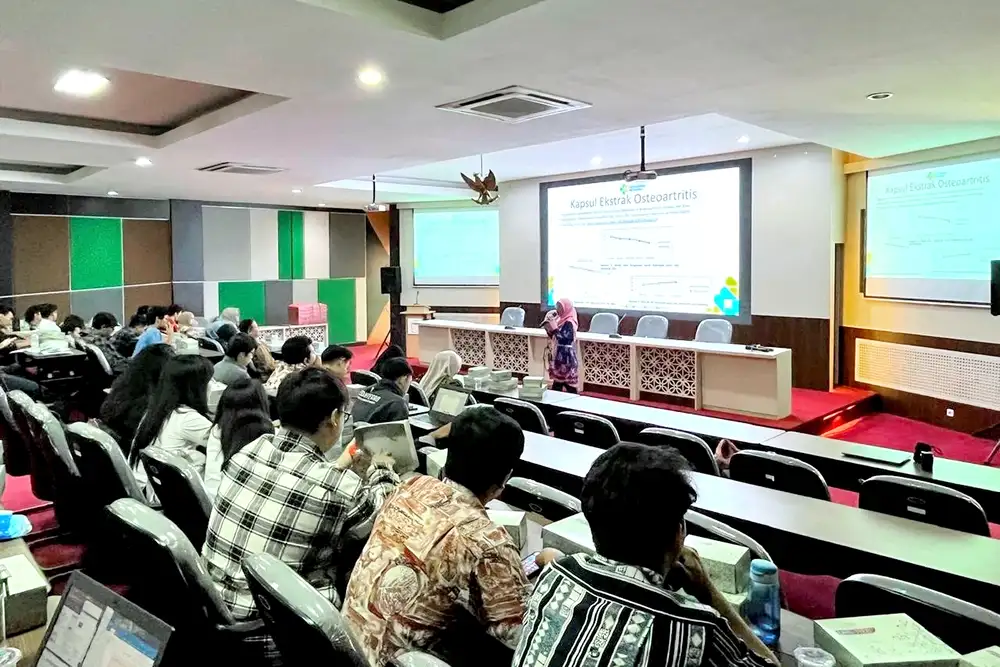Pharmacology FK UNS Holds Expert Lecture “Opportunities for Utilizing Herbal Preparations in Health Services”

Herbal medicine is a medicinal preparation derived from plants that have therapeutic effects on humans. Based on data from the World Health Organization, 80% of the world's population uses herbal medicine to overcome their health problems. Meanwhile, according to data from the Basic Health Research (RISKESDAS) in 2018, the proportion of Indonesian people who utilize Family Medicinal Plants (TOGA) is 24.6%. This shows the great need and interest of the Indonesian people in herbal medicine. In addition, Indonesia's condition with high plant biodiversity also increases the opportunities for the use of herbal medicine in Indonesia. Therefore, in order to support the use of herbs in Indonesia, especially in health services, the Pharmacology Faculty of Medicine (FK) of Universitas Sebelas Maret (UNS) held an expert lecture "Opportunities for the Use of Herbal Preparations in Health Services".
The expert lecture “Opportunities for Utilizing Herbal Preparations in Health Services” was held on Saturday, October 26, 2024 at the Hall of Building A, 3rd Floor, FK UNS. This activity was attended by all 2021 FK UNS students and the FK UNS Pharmacology academic community. The activity began with singing the song Indonesia Raya and the UNS March. Then, it was continued with remarks from the Vice Dean for Student Affairs and Alumni of FK UNS, Dr. Ratih Dewi Yudhani, dr., M.Sc. She emphasized that currently the need and interest of the community in using herbal medicines has increased, so more knowledge is needed for health workers to support this. The event continued with the presentation of material from the two speakers on the topic above, guided by Dr. Setyo Sri Raharjo, dr., M.Kes. as the moderator.

The first speaker in this expert lecture was Apt. Wahyu Widayani, S. Si from PT. Industri Jamu dan Farmasi Sidomuncul Tbk. She delivered material entitled "The Development of the Herbal Industry Entering the National Health System". The National Health System (SKN) is a health management organized by all components of the Indonesian nation in an integrated and mutually supportive manner to ensure the achievement of the highest level of public health. One of the SKN subsystems is pharmaceutical preparations and medical devices, where these pharmaceutical preparations include drugs, medicinal ingredients, and natural medicines. The opportunities for the herbal industry in Indonesia are shown by the high potential of the Indonesian nation, support from the government, international recognition, the use of herbs in formal health services, support from educational institutions, public recognition and awareness, and the opening of local and export markets. However, on the other hand, the herbal industry also has challenges and obstacles, such as the expansion of the pharmaceutical industry to herbal products, standardization regulations that require large capital, the push towards standardized herbal medicines (OHT) and phytopharmaceuticals, the high number of illegal products, and global competition. In addition, she said that the development of the herbal industry in Indonesia has increased every year. This development must be balanced with the standardization of product quality, efficacy, and safety, as well as product innovation.
The second speaker in this expert lecture was dr. Ulfatun Nisa, M. Biomed as the Head of UPF Traditional Health Services of Dr. Sardjito Hospital. She delivered a material entitled "Opportunities and Challenges of Herbal Medicine Scientification". Herbal medicine scientification is an effort to scientifically prove herbal medicine so that it can be used by health workers in formal health services in supporting promotive, preventive, curative, rehabilitative, and palliative efforts. The purpose of herbal medicine scientification is to provide a scientific basis (evidence based) for the use of herbal medicine, develop a service-based herbal medicine research network, increase herbal medicine research and development to obtain scientific evidence on the safety and benefits of herbal medicine, and increase the provision of safe, efficacious, scientifically tested herbal medicine, and widely used by the community and formal health services.

The next event in this expert lecture was a discussion and Q&A session. All participants were enthusiastic in asking questions and discussing with the two speakers. The expert lecture was closed with the presentation of souvenirs to the two speakers by the Head of the Pharmacology Department of the UNS Medical Faculty, Dr. Setyo Sri Rahardjo, dr., M.Kes.
Public Relation of FK UNS
 bahasa indonesia
bahasa indonesia 



